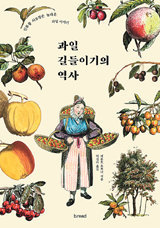Fruits become sweeter to survive
Fruits become sweeter to survive
Posted September. 17, 2022 07:22,
Updated September. 17, 2022 07:22

“And the LORD God took the man, and put him into the garden of Eden to dress it and to keep it. And the LORD God commanded the man, saying, Of every tree of the garden thou mayest freely eat: But of the tree of the knowledge of good and evil, thou shalt not eat of it: for in the day that thou eatest thereof thou shalt surely die..”
The Book of Genesis of the Christian Old Testament shows that humans subconsciously perceive orchards as the symbol of paradise. “I tried to show the lives and works of people who settled down between trees by explaining various types of orchards in history,” the German writer of nonfiction books about the natural world.
Unlike other parts of plants, fruits are sources of many nutrients that are given voluntarily by plants to seduce animals to spread seeds. Like humans and livestock, coevolution occurred between humans and fruits, reciprocally affecting each other's evolution.
Humans have transformed fruits to be more attractive to them, and plants, which bear fruits to spread seeds, also affect humans. Primates who eat fruits have a 25 percent bigger brain than non-fruit-eating species. Humans needed to know when fruits are ripe, which fruits aren’t poisonous, and what color ripe fruits have to consume them. Ape-man, which is ancestral to present-day humans, started to eat fruits. From that point, humans cannot synthesize vitamin C. Creating an orchard is a planned investment that is fruitful only in the future. Hence, it contributed to the formation of a civilization.
Fruits have also changed in size, sugar content, color, and scent. Apples in the past could only be consumed when dried because of their bitterness. But now, there are a lot of varieties of apples that are appealing to humans. Roman Empire was the hub that brought and spread fruits from everywhere. Pliny the Elder, who wrote the encyclopedic Naturalis Historia - a model for encyclopedias - carried some 1,000 types of fruits, and 71 of them were grapes for brewing.
Fruits have an abundant history of culture and art as well. Cezanne said that he would surprise Paris with an apple, and he did so with so many great paintings of apples. Renoir could separate olive oil harvested from his private land just by tasting it.
gustav@donga.com







